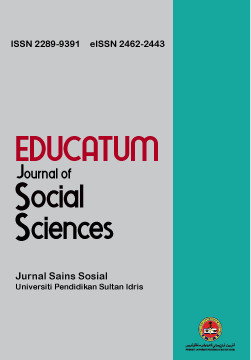The implementation of Alternative Learning System in public schools in Isabela, Philippines
DOI:
https://doi.org/10.37134/ejoss.vol7.1.3.2021Keywords:
implementation, alternative, learning system, implementerAbstract
The main purpose of the Alternative Learning System (ALS) is to eradicate illiteracy among out of school children, youths and adults who are school dropouts and to those who are deprived of education in order to complete elementary and secondary education outside the formal school system. Thus, this study was designed to determine the level of implementation of the Alternative Learning System (ALS) in the Schools Division of Isabela. It utilized the descriptive-correlational method involving fourteen (14) districts. The main instrument for data collection is the survey questionnaire while weighted mean, Mann-Whitney U-test and Kruskal-Wallis H-test were carried out to answer the research objectives of the study. Results of the study showed that implementation of ALS program in public schools in the Division of Isabela are commendable. They perceived the implementation of ALS program generally as very good. The data showed that majority of them revealed that relevance of instructional materials use during ALS sessions was outstanding. They affirmed that facilities and equipment were always available, enough, relevant, with quality, accessible and safe in the learning centers. They also perceived that financial resources appropriation, availability, and sufficiency exist in the ALS program implementation. Moreover, majority of the respondents revealed that establishing linkages, participation of stakeholders such as parents and government officials and attitude of ALS implementers were very good. There are significant differences in some areas of the factors in the implementation of Alternative Learning System. On the basis of the results of the study, it is then recommended that ALS Implementers consistently build and maintain positive working relationship with the barangay officials and other stakeholders to win their full cooperation in the implementation of the ALS programs and projects. Furthermore, the learners are advised to be guided accordingly and comply with the regular attendance as scheduled by the assigned ALS implementer in the ALS centers, and other linkages and partners may work hand and hand to extend financial support as needed in the implementation of the ALS program. Nevertheless, there should be a proper monitoring and evaluation tool designed by the Department of Education (DepEd) to identify priorities and needs and ensure proper technical assistance to ALS implementers in the field. For further research, this study can be replicated in the higher level utilizing other parameters.
Downloads
References
Abasolo, A. (2017). “Developing a scheme of action for enhanced alternative Learning System”. https://www.academia.edu/35207632/DEVELOPING_A_SCHEME_OF_ACTION_FOR_ENHANCED_ALTERNATIVE_LEARNING_SYSTEM
Alternative Learning System, Department of Education (Deped Official Website. Retrieved from: http://deped.gov.ph/als
Apao, L., Dayagbil, F., and Abao, E. (2014). Alternative Learning System Accreditation and Equivalency (ALS A&E) Program: Quality of life beyond poverty. International Journal of Interdisciplinary Research and Innovations 2(4), 20-26. Retrieved from www.researchjournals.com
Atilano, EB., Omanito RG., Zayra, CD., Domingo, JM., Garbin, SN (2016). Factors influencing the dropout rate in Alternative Learning System – Accreditation and Equivalency. The Online Journal of New Horizons in Education 6(4)
Banach, M. Gregory, PJ. (2001). Essential tasks, skills, and decisions for developing sustainable community-based programs for children, youth, and families at risk. Journal of Extension, joe.orgExecutive Order No. 356, s. 2004 Renaming the Bureau of Non- Formal Education to Bureau of Alternative Learning System. Malacañang, Manila. https://www.officialgazette.gov.ph/2004/09/13/executive-order-no-356-s-2004/
Madrid, EP (2004). Commitment, instructional competence and teaching satisfaction of the Alternative Learning System instructional managers in the Division of Pasay, Unpublished Thesis, Faculty of the Graduate School, Laguna Northwestern College, San Pablo, Laguna, Philippines
Marquez, J. (2012). Project: Sagip-Dunong ALS Program (2002). Arnold Janssen Foundation Journal. https://www.academia.edu/36361852/TEACHERS_COMPETENCE_AND_LEARNERS_PERFORMANCE_IN_THE_ALTERNATIVE_LEARNING_SYSTEM_TOWARDS_AN_ENRICHED_INSTRUCTIONAL_PROGRAM
McDonald, E. (2012). Setting Expectations. http://www.inspiringteachers.com/classroommanagement Discipline/setting_expectations.html, retrieved January 16, 2017
Mendoza, A. (2011). ALS in the Philippines as compared to other Asian countries.
Moralista, R. B., Delarierte, G. C. (2014). Alternative learning system (ALS education): Its influence on the intellectual abilities of the indigenous people. Asia Pacific Journal of Education, 1, 7-10.
Pappas, C. (2013). The Adult Learning Theory - Andragogy - of Malcolm Knowles https://elearningindustry.com/the-adult-learning-theory-andragogy-of-malcolm-knowles
Republic Act No. 9155 of Section 2 otherwise known as Governance of Basic Education Act of 2001. https:// www.officialgazette.gov.ph/2001/08/11/republic-act-no-9155
Schiro, M. S. (2012). Curriculum theory: Conflicting visions and enduring concerns. (2nd Ed.). Los Angeles: Sage Publications.
The Philippine Constitution (1987) of Article XIV, Section 2. https://www.officialgazette.gov.ph/constitutions/the-1987-constitution-of-the-republic-of-the philippines/the-1987-constitution-of-the-republic-of-the-philippines-article-xiv/
Tindowen DJC, Bassig JM, Cagurangan J-A. (2017). Twenty first century skills of Alternative Learning System Learners. SAGE Open. doi:10.1177/2158244017726116
United nations International Children’s Emergency Fund (2008). http://www.ibe.unesco.org/fileadmin/user_upload/Policy_Dialogue/48th_ICE/General_Presentation-48CIE-English.pdf
Woolfolk, Anita, 2007. Educational psychology. Boston: Pearson / Allyn and Bacon.





